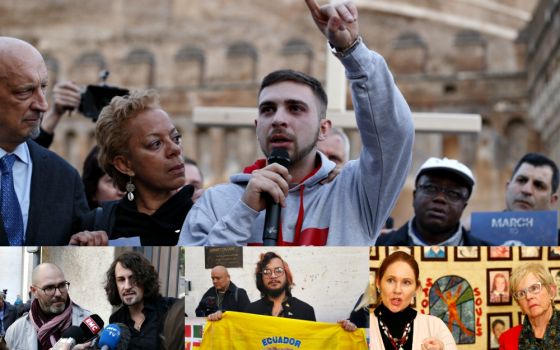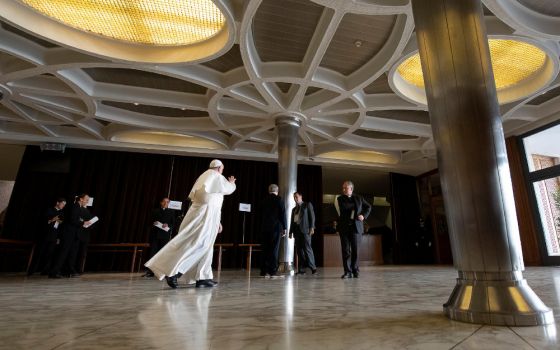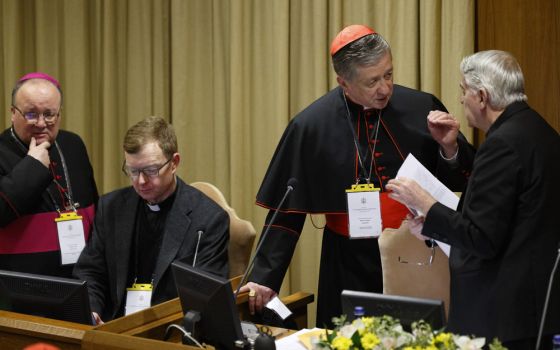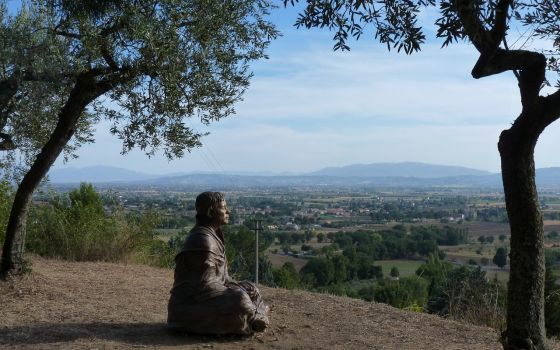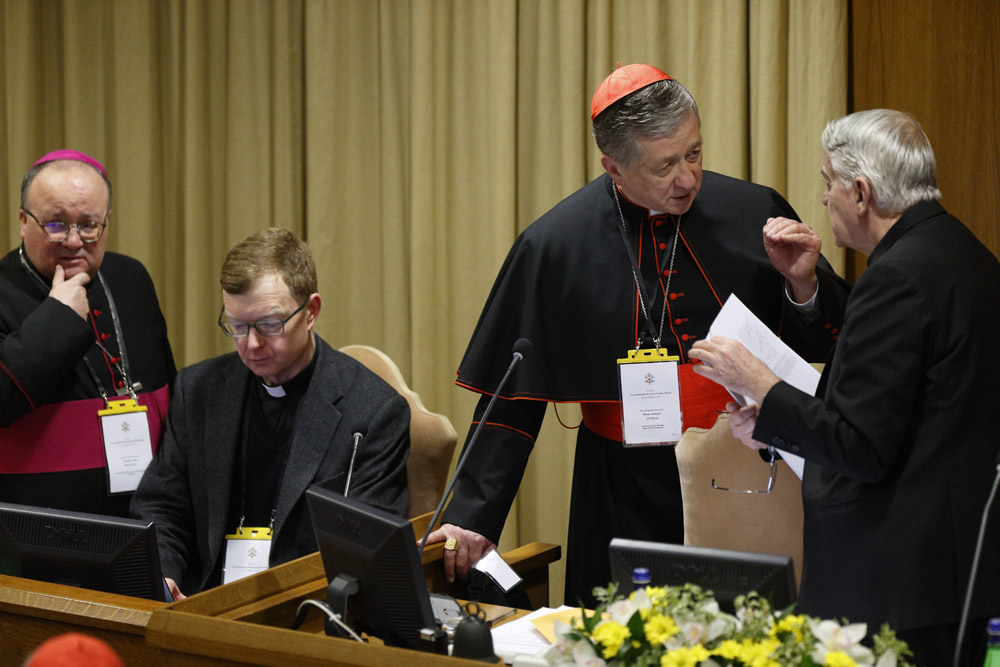
Cardinal Blase Cupich of Chicago talks with Jesuit Fr. Federico Lombardi Feb. 23, the third day at the meeting on the protection of minors in the church at the Vatican. At left: Archbishop Charles Scicluna of Malta and Jesuit Fr. Hans Zollner, president of the Centre for Child Protection at the Pontifical Gregorian University in Rome. (CNS/Paul Haring)
For decades we've heard countless opinions of what has caused the clergy sex abuse crises in the Catholic Church: clericalism, celibacy, bad seminary formation. But on the closing day of the bishops' summit on the protection of minors, we heard a new theory: the devil made them do it.
That's what Pope Francis suggested multiple times and in various ways in his speech at the conclusion of the Meeting on the Protection of Minors in the Church.
"Consecrated persons, chosen by God to guide souls to salvation, let themselves be dominated by their human frailty or sickness and thus become tools of Satan." Francis claimed.
It wasn't, of course, the first time Francis' has spoken about Satan and blamed him for personally engineering the destruction of the church.
In his book The Tweetable Pope, author Michael O'Loughlin writes that "Francis has tweeted about the devil so often that he's had to ascribe different names in order to keep Satan and his different forms relevant within the Twittersphere."
Francis sees cosmic battles happening all over the face of the earth and now he has made the sex abuse crisis into a metaphysical battle between Satan and the church. In his concluding speech, he mentioned Satan twice and evil 13 times. The word clericalism was uttered once.
Perhaps the pope thought overblown language and imagery would somehow express the profundity of his horror at this situation, but the speech — which may have been the most crucial of his papacy — ended up being a melodramatic avoidance of the truth.
The truth is there are some very sick men in the priesthood that need very serious help and there are some men in the priesthood who are so psychosexually immature or damaged that they have no place in ministry. And the closed, secretive, all-male power structure of the church protected these men and gravely exacerbated the situation.
Satan did not swoop in and use these men as his tools to destroy the church. These men destroyed it all by themselves by enforcing a warped view of sexuality, making the preservation of their patriarchal rule their first priority and trading in cover-ups, lies and institutional blackmail.
But while Francis set out to boldly slay metaphysical dragons, his army of prelates slouched through a four-day slog.
The cardinals, archbishops and other high-ranking clergymen who appeared at the summit's daily press briefings looked at turns exhausted by the weight and bleakness of the situation, embarrassed by their obvious incompetence, confounded by some of their peers' refusal to see why sex abuse is a problem, and generally adrift in the cesspool they have created. It was so dismal that Satan didn't need to creep into the picture.
Survivors and their advocates were right to be disappointed that their basic demands were not met, but anyone listening to these press briefings would not have been surprised. Since all question-and-answer dialogues and working group sessions were off-limits to the press, our only insights into the inner workings of the meeting came from off-the-cuff remarks at these press conferences.
And these comments gave the distinct impression that the bishops who traveled to Rome were nowhere near ready to take action.
At the day one briefing we learned from the comments of Archbishop Mark Coleridge of Brisbane, Australia, that some of his brother bishops from Africa and Asia were confused about why they were called to Rome. "Why are we just talking about sexual abuse?" they wondered. In their countries, child soldiers and child enslavement were also prevalent forms of child abuse.
It was worrying that they could not make the distinction.
On day two, we were told that in preparation for the summit, bishops were asked to meet with survivors in their own dioceses.
"Many bishops have not had that experience," admitted Cardinal Sean O'Malley of Boston.
"Our Holy Father realizes that in different parts of the world the responses to sexual abuse and outreach to survivors varies very, very much," O'Malley added.
Later at that briefing, Jesuit Fr. Frederico Lombardi, moderator of the summit, was asked why the zero tolerance policy demanded by survivors could not be enacted. He insisted that such a procedure wasn't sufficient to really confront the problem.
"The definition of zero tolerance," does not cover the aspects of "pastoral care for victims, accompaniment, selection of members of the clergy, prevention in parishes and in our activities," Lombardi explained. "It refers to one way of punitive action against criminals" and isn't "helping us tackle the complexity and breadth of these problems."
So, the refusal to enact zero tolerance is a problem of semantics?
We were told that two changes would be made to canon law immediately. The first would be to raise the minimum age that a girl can marry from 14 to 16. The second change would declare any pornographic material involving minors under the age of 18 as a "grave crime." The maximum age is currently 14.
Any feeling of optimism at these changes were overshadowed by the unsettling realization that the minimum ages had been so low in the first place.
On day two, Cardinal Blase Cupich of Chicago, one of the organizers of the meeting, suggested that talking about sex with some of the other bishops was like going back to his childhood in the 1950s "when things were not talked about." Many bishops, he said, are from parts of the world "where human sexuality isn't talked about the way it is in the Western world" and are from a culture that "does not have any experience of talking about intimate personal issues in a public way."
If the Catholic Church in the West is a model of speaking openly about sexuality, we may all be doomed.
There was much verbal jousting about what the difference is between an accusation and a credible accusation and what the criteria is for both. It was clear there was no consensus among the prelates on this sticky wicket.
But it was the comments of Malta Archbishop Charles Scicluna, who appeared at each briefing and spoke the most, that offered the biggest window into just how ill-equipped these hierarchs were to take any concrete steps or develop a policy.
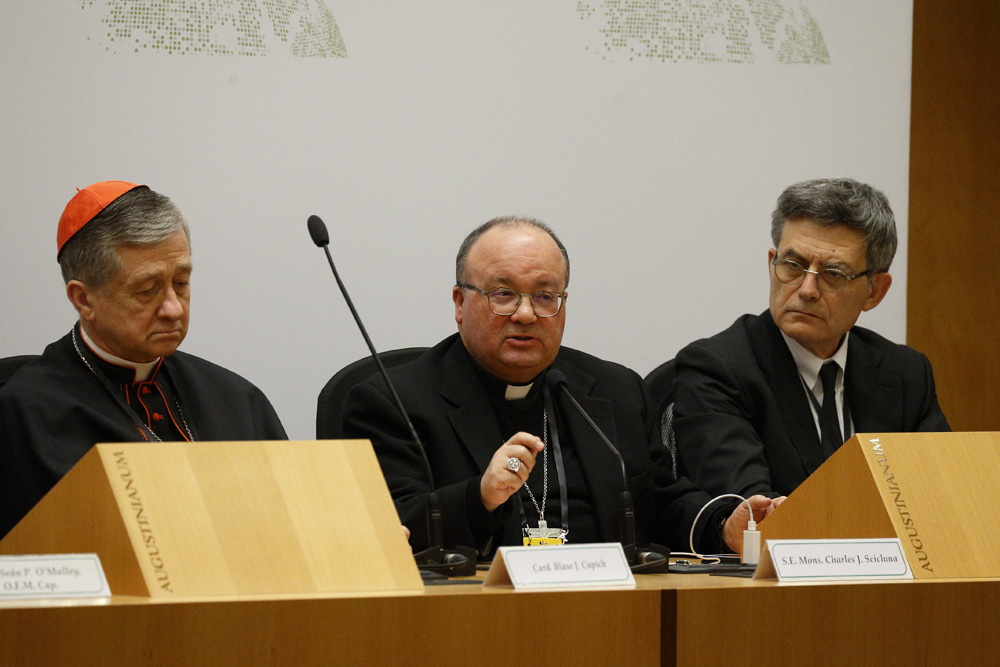
Cardinal Blase Cupich of Chicago, Archbishop Charles Scicluna and Paolo Ruffini, head of the Vatican's Dicastery for Communication, attend a media briefing Feb. 22. the second day of the Vatican meeting. (CNS/Paul Haring)
"We can pass as many laws as you want, but with no real sense of ownership we're not going to get anywhere," Scicluna admitted.
In other words, a lot of bishops had not only refused to listen to survivors of sexual abuse, they had treated them like enemies of the church. And, again, many didn't even think this was a problem.
Scicluna announced one of the most significant realizations was that "for decades we were concentrating on the crime." Bishops were finally realizing that "covering up is also equally egregious. I think that is a very important point."
If it's taken decades to come to that kind of revelation, we've got a long way to go.
In addition to his work as the Vatican's point person on sexual abuse cases, Scicluna is adjunct secretary at the Congregation for the Doctrine of the Faith, the wing of the curia that, since 2001, has been handling cases of sexual abuse.
Pressed by the media as to why the CDF has offered no statistics on sexual abuse after nearly two decades of managing sex abuse claims, Scicluna confessed that there were none, though he hoped there would be … eventually. "We didn't stop and think, 'Why don't we have an in depth study?' "
One couldn't help but think that perhaps the statistics would be so damning, it would only further damage the institutional church's already fragile credibility.
One got that sense that Scicluna was worried that whatever awakening had occurred among the prelates over the weekend might not stick.
"I hope that our attitude will remain that of listening to people because it is essential as a motivation for getting it right," he said. "If you don't meet victims, you'll never understand why you need to get it right."
Scicluna was also the most willing to admit the church's failings. Not only had bishops ignored victims or treated them like foes, even those survivors who had been listened to and those who actually managed to get the church to take action were ultimately forsaken.
"There is no mechanism to inform victims of what has happened. Sometimes there is a trial and the victims know nothing about it. There is no follow up," Scicluna admitted. "There needs to be more communication with victims."
Throughout days of the summit, survivors of clergy abuse from 20 different countries demonstrated outside the Castel Sant'Angelo and on the Piazza del Popolo; they marched through the streets of Rome demanding a zero tolerance policy; they spoke to legions of reporters. Through it all, not one cleric stepped outside to greet them.
Asked by CNN at the final press briefing why they were never invited to speak to the bishops, Scicluna's best response was "that's a valid point."
That final press conference did make promises of concrete actions: a motu propio for how to handle claims of abuse within the Vatican City State; the creation of task forces of experts to helps dioceses manage sexual abuse claims; and a handbook for how to respond to accusations.
But this would all be accomplished on Italian time. "In the not too distant future," or "in the near future" was constant refrain anytime the churchmen were asked for a timeline.
The meeting, it turns out, wasn't about creating policies, it was about "a spirit of conversion," a sentiment echoed by many prelates.
"This has really reached the heart level," said Jesuit Fr. Hans Zollner at the final press briefing. "And if you get to that level, you cannot be as you were before. You are transformed."
But this sounded like a spiritual spin on what really happened: the summit was about convincing bishops that sexualized violence by clergy is bad, it is a problem that threatens to take down the church, and it must become a priority for all bishops.
And that is why nothing substantive seemed to get accomplished. Because this is the pathetic state of our hierarchy. And for perhaps the first time in history, centuries of denial, violence, hypocrisy, conniving and silencing is just starting to come home to roost.
Advertisement
And that, I think, is the solace that survivors and their supporters can take heart in: if not for their prophetic voices, this historic summit would never have happened. Even though the outcome was disappointing and demoralizing, the survivors forced these men to stop and finally start to reckon with the startling and sickening harm they have created and the damage they have unleashed.
Mercy Sr. Theresa Kane has often said that "courage" means a rage within one's heart. It perfectly describes the survivors that I saw not only on the streets of Rome, but all of those who, for decades, have raised their voices and put their bodies on the line to speak to truth to power. They have held and supported one another as a community of prophets. They have bravely faced their horrifically traumatic pasts and have transformed into indomitable spirits who will persist until they see justice.
These survivors proved once again that, while the pope declares his holy war on some abstract force of evil and the bishops flounder to develop policies that should have been in place decades ago, they will continue to be our church's only real hope.
[Jamie Manson is a columnist and the books editor at National Catholic Reporter.]
Editor's note: We can send you an email alert every time Jamie Manson's column, Grace on the Margins, is posted to NCRonline.org. Go to this page and follow directions: Email alert sign-up.





